Duke Heart Pulse for week ending Feb 27th 2022
Highlights of the week:
Thank you, Residents & Fellows
On behalf of the Duke Heart Leadership team and faculty across the Divisions of Cardiology and Cardiovascular and Thoracic Surgery, we thank each and every one of our trainees – our surgery residents and all fellows — we hope you know how much we value and appreciate the work you do, your dedication to patient care, and the fact that you chose to spend your training years here with us in Durham, NC.
These are not easy years for anyone who chooses to embark on a career in surgery or medicine – but we hope you find your time here fulfilling, enriching, fun and inspiring. This week happens to be GME Appreciation Week, but your work matters today and every day, and it will matter for years to come. Thank you for the many ways in which you inspire each of us and for being part of the Duke Heart family!
Voting for USNWR ‘Best Hospitals’ Now Open in Doximity
 The survey period for U.S. News & World Report’s ‘Best Hospitals’ is now open in Doximity. We encourage all those who are eligible to vote in the survey of “Best Hospitals for Cardiology and Heart Surgery” to consider casting a vote for Duke’s hospitals – this is a great way to support our efforts in leading the country in patient care, innovation, research and the education of future specialists.
The survey period for U.S. News & World Report’s ‘Best Hospitals’ is now open in Doximity. We encourage all those who are eligible to vote in the survey of “Best Hospitals for Cardiology and Heart Surgery” to consider casting a vote for Duke’s hospitals – this is a great way to support our efforts in leading the country in patient care, innovation, research and the education of future specialists.
Reminder: paper surveys have been discontinued. The only way to vote in the survey is online via Doximity.
If you have not yet claimed your profile on this platform, you can do so at any time during the voting period.
- Go to Doximity.com
- Enter your first and last name on the home screen
- Click on the ‘Find My Profile’ button
A survey will display in your profile until you vote or the survey closes on March 25, 2022.
Circulate! 2022 Recognizes Duke Efforts
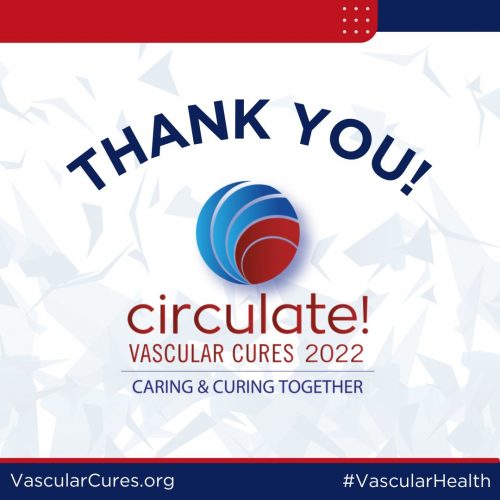 Members of the Duke Heart team were recently celebrated by our Vascular Cures partners at Circulate!, their annual gala held to celebrate the work done throughout the year by patient advocates, industry members and researchers, all of whom are dedicated to improving the care of patients with vascular disease.
Members of the Duke Heart team were recently celebrated by our Vascular Cures partners at Circulate!, their annual gala held to celebrate the work done throughout the year by patient advocates, industry members and researchers, all of whom are dedicated to improving the care of patients with vascular disease.
According to Megan Patterson, chief executive officer of Vascular Cures, all proceeds from the gala support national education and awareness initiatives that help at-risk populations, patients, and their caregivers. This year’s gala was held virtually on Feb. 3.
Some of the work done through Duke in support of Vascular Cures and honored this year include the following:
Chronic Limb-Threatening Ischemia (CLTI) Research
Manesh Patel, MD and E. Hope Weissler, MD, a resident in our Vascular Surgery Integrated Residency Program, 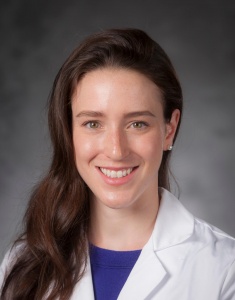 are members of the Vascular Cures Chronic Limb-Threatening Ischemia (CLTI) Working Group for Patient Engagement, an initiative to promote and facilitate CLTI patient engagement in research. Patel and Weissler comprise half the team responsible for organizing this working group. This initiative is designed to build capacity to engage CLTI patients in research as advisors and participants, so that study results align with the needs of patients. It also works to prioritize the kinds of research that are most important to patients. Ultimately, the goal of this work is to create new knowledge and treatments that more closely align with CLTI patient needs and improve health outcomes in this population.
are members of the Vascular Cures Chronic Limb-Threatening Ischemia (CLTI) Working Group for Patient Engagement, an initiative to promote and facilitate CLTI patient engagement in research. Patel and Weissler comprise half the team responsible for organizing this working group. This initiative is designed to build capacity to engage CLTI patients in research as advisors and participants, so that study results align with the needs of patients. It also works to prioritize the kinds of research that are most important to patients. Ultimately, the goal of this work is to create new knowledge and treatments that more closely align with CLTI patient needs and improve health outcomes in this population.
Kevin Southerland, MD, assistant professor of vascular surgery, is the 2021 Wylie Scholar Award recipient for his  project Transcriptional Dynamics and Heterogeneity of Macrophages in Chronic Limb Threatening Ischemia. The award is given annually by the Vascular Cures Foundation and the Society for Vascular Surgery Foundation. Chronic limb-threatening ischemia (CLTI) is the most severe manifestation of peripheral arterial disease. Patients with CLTI are at high risk for limb loss and death. A significant number of CLTI patients suffer limb loss despite successful restoration of arterial flow. Novel approaches to treat CLTI remain an unmet clinical need. The goal of Dr. Southerland’s work is to understand the communication signals between the various cell types in the ischemic limb. He is particularly interested in how macrophages interact with muscle stem cells. He believes that understanding these mechanisms will be the groundwork for the development of new therapies for CLTI patients.
project Transcriptional Dynamics and Heterogeneity of Macrophages in Chronic Limb Threatening Ischemia. The award is given annually by the Vascular Cures Foundation and the Society for Vascular Surgery Foundation. Chronic limb-threatening ischemia (CLTI) is the most severe manifestation of peripheral arterial disease. Patients with CLTI are at high risk for limb loss and death. A significant number of CLTI patients suffer limb loss despite successful restoration of arterial flow. Novel approaches to treat CLTI remain an unmet clinical need. The goal of Dr. Southerland’s work is to understand the communication signals between the various cell types in the ischemic limb. He is particularly interested in how macrophages interact with muscle stem cells. He believes that understanding these mechanisms will be the groundwork for the development of new therapies for CLTI patients.
Patient Reported Outcome Measures in Peripheral Artery Disease (PAD)
Patel and Jennifer Rymer, MD have been instrumental in facilitating the Vascular Cures Working Group on
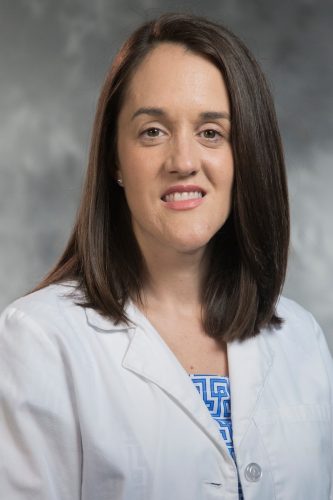
Patient-Reported Outcome Measures in PAD, which resulted in the recently published (23 Dec 2021) review article in Circulation: Cardiovascular Interventions, “Patient-Reported Outcome Measures in Symptomatic, Non-Limb Threatening Peripheral Artery Disease: A State-of-the-Art Review”.
The Circulate! gala includes the announcement of the recipient of the Ron Stoney Vascular Hero Award which is given annually to an outstanding care provider and/or researcher who goes above and beyond to advocate for patients. Stoney, a surgeon and professor emeritus at UCSF, co-founded Vascular Cures in 1982 to “save and improve the lives of those living with vascular diseases outside the heart.”
This year’s honoree was Manesh Patel, MD.
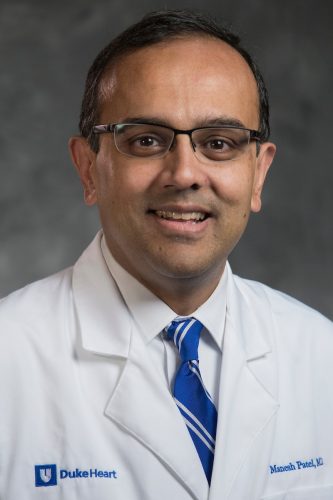
“Dr. Patel received this award not just because of the incredible support he has provided Vascular Cures as an advisor, but his persistent and passionate commitment to improving vascular health for patients through research and other national initiatives with organizations like the American Heart Association,” says Patterson. “He is a visionary and is always inspiring us to do more and do it better so that more people can have happy healthy lives.”
Congratulations to Hope, Jenn, Kevin and Manesh – well deserved recognition for the work you are doing!
Kelsey Appointed to CAAHEP’s JRC on Education in CV Technology
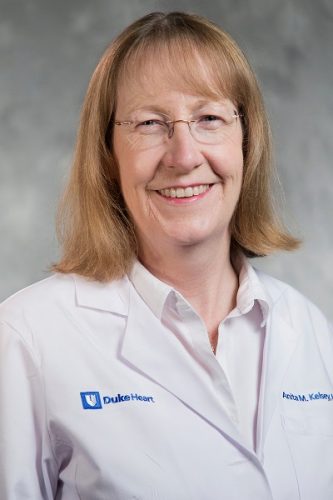
Congratulations to Anita M. Kelsey, MD, MBA! Kelsey has been appointed as Commissioner for the Joint Review Committee on Education in Cardiovascular Technology (JRC) by the Commission on Accreditation of Allied Health Education Programs (CAAHEP). CAAHEP is the largest programmatic accreditor of the health sciences professions.
Originally established in 1976 by the American Medical Association as the Committee on Allied Health Education and Accreditation (CAHEA) with our own Joseph Kisslo, MD and Kitty B. (Filly) Kisslo (who was then at Stanford) as founding JRC members who led the way in defining the standards of cardiac sonography.
CAAHEP reviews and accredits more than 2100 individual education programs across 32 health science occupations. CAAHEP-accredited programs are assessed on an ongoing basis to ensure they meet the standards and guidelines of each profession.
Duke’s Cardiac Ultrasound Certificate Program received CAAHEP accreditation in 2021. We are proud to be accredited by this organization that upholds the highest standards of quality, outcomes-based education. We are equally as proud of Dr. Kelsey for her new role.
Congratulations Dr. Kelsey, for your work to ensure quality allied health education here at Duke and, now, across the U.S. as part of CAAHEP. Way to go!
Newest HF Collaboratory Members Include Three from Duke Heart
Congratulations to cardiology fellows Vanessa Blumer and Shahzeb Khan, and to former cardiology fellow Jordan Pomeroy! Blumer, Khan and Pomeroy were each asked to join the Heart Failure Collaboratory (HFC), and all were welcomed as new members last week during a quarterly meeting of the HFC’s Drugs and Devices Working Group.
Excellent additions to the Collaboratory!
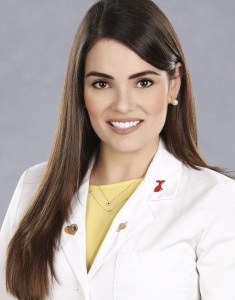

Paul Farmer, MD & Dzau Distinguished Lecture in Global Health
We were shocked and deeply saddened this week by the passing of Duke alumnus and trustee emeritus Dr. Paul Farmer, who — along with Dr. Agnes Binagwaho, vice chancellor of the University of Global Health Equity in Rwanda — delivered the annual Victor J. Dzau Distinguished Lecture in Global Health on Jan. 26, 2022.
For those who were unable to attend that event (held via Zoom), we share the following article by our colleagues at Duke Global Health Institute. The article includes a link to the lecture: https://globalhealth.duke.edu/news/never-try-save-people-without-them-participating.
Reaction to his passing was swift and widespread. A compilation of moving tributes, including several from members of our Duke Heart team, can be found here: https://globalhealth.duke.edu/news/dghi-reacts-death-dr-paul-farmer
Duke Today’s memorial piece about Farmer is available here: https://duke.is/jmxq6.
ICYMI: Genomic & Precision Medicine Forum
Duke Heart’s Bill Kraus was guest speaker at the Genomic & Precision Medicine Forum sponsored by the Duke Center for Applied Genomics & Precision Medicine on Thursday, Feb. 24. His lecture, “Components of Personalized Lifestyle Medicine with a Focus on Physical Activity” can be viewed here.
Great job, Bill!
Participants in Duke’s PROMOTE Study Hope to Improve Care for Type 2 Diabetes
Joining Duke’s diabetes study in Kannapolis at the N.C. Research Campus was part of Susan Wagner’s commitment to improving the health of her community.
“I have diabetes, and it’s somewhat under control. But I wanted to provide Duke with statistical data that they will need to build a model to address the issues of diabetes in Cabarrus County,” said Wagner, of Concord.
Retired from manufacturing, Wagner, 68, participates in several Duke Clinical and Translational Science Institute (CTSI) studies in Kannapolis, including the PROMOTE study. PROMOTE will assess whether a test product can improve insulin sensitivity in people with Type 2 diabetes.
The study seeks more people like Wagner, who are between the ages of 18 and 70 and are under the care of a healthcare professional for management of their disease.
“This study fit into the bigger picture for me,” she said. “I don’t know if I am getting the placebo or the product, but diabetics in Cabarrus County need data to improve their health.”
Study participation lasts about 15 weeks with six appointments in either Kannapolis or Durham. Participants are randomly assigned to receive either the test product or placebo.
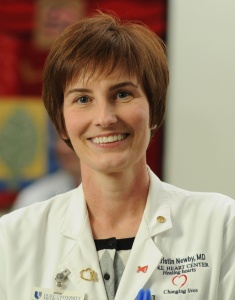 The PROMOTE team in Kannapolis, led by Duke cardiologist Dr. Kristin Newby, recently expanded the study to a new Duke research facility in Durham. Launched in October 2020, Duke Research at Pickett Road encourages community participation and diversity in clinical research by providing a convenient and comfortable site for study participants and researchers.
The PROMOTE team in Kannapolis, led by Duke cardiologist Dr. Kristin Newby, recently expanded the study to a new Duke research facility in Durham. Launched in October 2020, Duke Research at Pickett Road encourages community participation and diversity in clinical research by providing a convenient and comfortable site for study participants and researchers.
“We are grateful to our study participants for their contributions to answering important healthcare questions,” Newby said. “Diabetes mellitus is such a challenging disease that affects almost every system in the body and can lead to a number of major long-term health consequences. Research into ways to improve management of diabetes is critical to reduce the burden of illness resulting from diabetes mellitus. To this end, we are excited to work with the community to conduct studies like PROMOTE.”
Wagner, who has had Type 2 diabetes since 1995, began focusing on diet and exercise when she took a class at Cabarrus Health Alliance and began reading labels, counting steps, and keeping a daily food log.
As her focus on health grew, Wagner began volunteering at Green Leaf Farms in the garden. She now eats mostly food that she has helped grow, and she’s enjoying relatively good health.
“This is not something that happened overnight,” Wagner said. “Part of this evolution was to join the PROMOTE study, as well as doing things like getting enough sleep and eating correct portions. It’s about expanding your toolbox.”
Like Wagner, Rosa Dorantes has Type 2 diabetes and participates in several Duke studies in Kannapolis. She 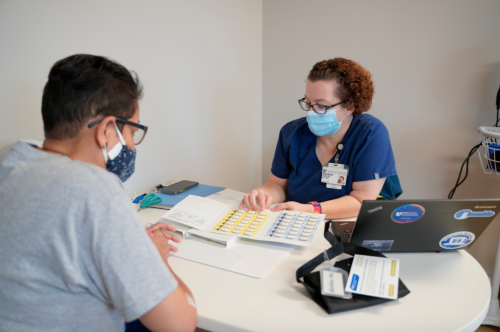 joined PROMOTE after returning home to Granite Quarry from Mexico, where she had cared for a loved one who eventually passed away from complications due to diabetes.
joined PROMOTE after returning home to Granite Quarry from Mexico, where she had cared for a loved one who eventually passed away from complications due to diabetes.
Her family history of diabetes, and witnessing the devastating effects of the disease if untreated, motivated Dorantes to begin participating in clinical research seven years ago.
“I never thought that I would be a research participant, but it is important to me to help other people by helping researchers find new medicines,” said Dorantes, 56. “People are suffering.”
Dorantes, who works for her daughter’s diaper service in Charlotte, said she has improved her health by eating well and staying active. When her PROMOTE appointments are complete, she plans to keep enrolling in new studies.
“We are regular people,” she said. “For me to be able to do something like this, to perhaps save a life or help find a new medicine to help people, I can say I did something good during my journey.”
People who want to learn whether they qualify for PROMOTE can call 704-273-5456, email mailto:TransPop@duke.edu or visit duketranspop.org/promote. Compensation is provided for completed study activities.
To learn more about the Duke CTSI clinical research facility in Kannapolis, visit https://ctsi.duke.edu/research-support/duke-kannapolis. To learn more about Duke CTSI, visit ctsi.duke.edu.
COVID-19 Updates
The COVID-19 Employee Hotline hours are changing to reflect recent utilization trends. Beginning March 1, the hotline will be available during these times:
- Monday — Friday: 8 a.m. to 5 p.m.
- Saturday — Sunday: 8 a.m. to 12 p.m.
The phone number for the hotline is 919-385-0429 (option 1).
All the latest Clinical Operations updates related to COVID can be found at https://covid-19.dukehealth.org.
Upcoming Events & Opportunities
Cardiology Grand Rounds
March 1: Toward Allograft Longevity: Leveraging Multiomic Approaches to Understand Biomarkers and Biology of Heart Transplant Outcomes with Lauren Truby. 5 p.m. via Webex.
Duke Research & Innovation Virtual Conference
March 3 & March 4: The Evolving Role of Universities in the American Innovation System
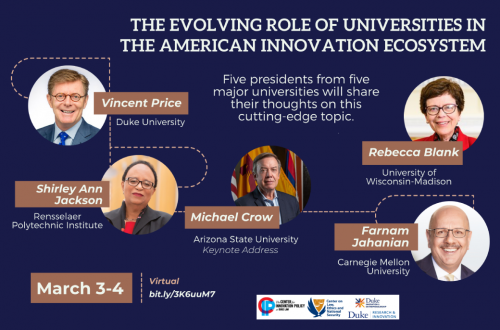 Duke Research & Innovation is proud to co-sponsor The Evolving Role of Universities in the American Innovation System, a two-day virtual conference discussing the role of university research in the U.S. innovation ecosystem.
Duke Research & Innovation is proud to co-sponsor The Evolving Role of Universities in the American Innovation System, a two-day virtual conference discussing the role of university research in the U.S. innovation ecosystem.
Hosted by the Center for Innovation Policy at Duke Law, this conference aims to outline a new framework for America’s universities in the context of the country’s long-term competitive future and features five presidents from five major universities, including Duke’s very own President Price.
The conference kicks off next Thursday, March 3rd and is open to everyone. Registration is required.
Upcoming Duke Heart CME
April 23: Duke Sports Cardiology & Sudden Death in Athletes Symposium with course directors Jim Daubert and Bill Kraus. Virtual. For information or to register, contact Christy Darnell christy.darnell@duke.edu or 919-880-8686.
Have news to share?
If you have news to share with the Pulse readership, please contact Tracey Koepke, director of communications for Duke Heart at tracey.koepke@duke.edu. We would love to hear about your latest accomplishments, professional news, cool happenings, and any events or opportunities that may be of interest to our Duke Heart family. Please call with any questions: 919-681-2868. Feedback on Pulse is welcome and encouraged. Submissions by Noon, Wednesdays, to be considered for weekend inclusion.
Duke Heart in the News:
February 17 — Christopher Granger
HCPLive
Multifaceted Therapy Interventions Suggested for Patients with Diabetes, ASCVD
https://duke.is/nerg3
February 17 — Kristin Newby
WBTV.com (Charlotte, NC)
Participants in Duke’s PROMOTE study in Kannapolis hope to improve care for Type 2 diabetes
https://duke.is/bxx9c
February 19 — Kristin Newby
Independent Tribune
Participants in Duke’s PROMOTE study hope to improve care for Type 2 diabetes
https://duke.is/2cnjj
February 19 — Christopher Granger
Medscape
Full-press Therapy Rare in Diabetes With ASCVD
https://duke.is/48mqn
February 22 — Duke Health
Advisory Board
Update: The ‘Best Employers’ in health care, according to Forbes
https://duke.is/95myg
February 24 — Duke University
Forbes.com
Johns Hopkins Tops List Of Leading Universities For NIH Funding In 2021
https://duke.is/4ggpc
February 28 — Allan Kirk
The New Yorker
The Medical Miracle of a Pig’s Heart in a Human Body
https://duke.is/9phm8
Division of Cardiology Publications Indexed in PubMed February 17-23, 2022
Bodkin N, Ross M, McClain MT, Ko ER, Woods CW, Ginsburg GS, Henao R, Tsalik EL. Systematic comparison of published host gene expression signatures for bacterial/viral discrimination. Genome Med 2022;14(1):18. PM: 35184750.
Fanaroff AC, Lopes RD. The role of triple antithrombotic therapy in patients with atrial fibrillation undergoing percutaneous coronary intervention. Prog Cardiovasc Dis 2021;69:11-17. PM: 34883097.
Fanaroff AC, Vora AN, Lopes RD. Non-vitamin K antagonist oral anticoagulants in patients with valvular heart disease. Eur Heart J Suppl 2022;24(Suppl A):A19-A31. PM: 35185406.
Kam W, Holmes DN, Hernandez AF, Saver JL, Fonarow GC, Smith EE, Bhatt DL, Schwamm LH, Reeves MJ, Matsouaka RA, Khan YM, Unverdorben M, Birmingham MC, Lyden PD, Asimos AW, Altschul D, Schoonover TL, Jumaa MA, Nomura JT, Suri MFK, Moore SA, Lafranchise EF. Association of Recent Use of Non-Vitamin K Antagonist Oral Anticoagulants With Intracranial Hemorrhage Among Patients With Acute Ischemic Stroke Treated With Alteplase. JAMA 2022;327(8):760-771. PM: 35143601.
Lam CSP, Ramasundarahettige C, Branch KRH, Sattar N, Rosenstock J, Pratley R, Del Prato S, Lopes RD, Niemoeller E, Khurmi NS, Baek S, Gerstein HC. Efpeglenatide and Clinical Outcomes With and Without Concomitant Sodium-Glucose Cotransporter-2 Inhibition Use in Type 2 Diabetes: Exploratory Analysis of the AMPLITUDE-O Trial. Circulation 2022;145(8):565-574. PM: 34775781.
Lau ES, Binek A, Parker SJ, Shah SH, Zanni MV, Van Eyk JE, Ho JE. Sexual Dimorphism in Cardiovascular Biomarkers: Clinical and Research Implications. Circ Res 2022;130(4):578-592. PM: 35175850.
Nelson AJ, O’Brien EC, Kaltenbach LA, Green JB, Lopes RD, Morse CG, Al-Khalidi HR, Aroda VR, Cavender MA, Gaynor T, Kirk JK, Lingvay I, Magwire ML, McGuire DK, Pak J, Pop-Busui R, Richardson CR, Senyucel C, Kelsey MD, Pagidipati NJ, Granger CB. Use of Lipid-, Blood Pressure-, and Glucose-Lowering Pharmacotherapy in Patients With Type 2 Diabetes and Atherosclerotic Cardiovascular Disease. JAMA Netw Open 2022;5(2):e2148030. PM: 35175345.
Pasquali SK, Thibault D, Hall M, Chiswell K, Romano JC, Gaynor JW, Shahian DM, Jacobs ML, Gaies MG, O’Brien SM, Norton EC, Hill KD, Cowper PA, Shah SS, Mayer JE, Jacobs JP. Evolving Cost-Quality Relationship in Pediatric Heart Surgery. Ann Thorac Surg 2022;113(3):866-873. PM: 34116004.
Peters AE, Mentz RJ, DeWald TA, Greene SJ. An evaluation of torsemide in patients with heart failure and renal disease. Expert Rev Cardiovasc Ther 2022;20(1):5-11. PM: 34936522.
Russo JJ, Yan AT, Pocock SJ, Brieger D, Owen R, Sundell KA, Bagai A, Granger CB, Cohen MG, Yasuda S, Nicolau JC, Brandrup-Wognsen G, Westermann D, Simon T, Goodman SG. Determinants of long-term dual antiplatelet therapy use in post myocardial infarction patients: Insights from the TIGRIS registry. J Cardiol 2022;79(4):522-529. PM: 34857432.
Utz PJ, Jain MK, Cheung VG, Kobilka BK, Lefkowitz R, Yamada T, Dzau VJ. Translating science to medicine: The case for physician-scientists. Sci Transl Med 2022;14(632):eabg7852. PM: 35171650.
Welsh RC, Dehghani P, Lopes R, Wojdyla DM, Aronson R, Granger CB, Windecker S, Vora AN, Vinereanu D, Halvorsen S, Parkhomenko A, Mehran R, Alexander JH, Goodman S. Impact of prior oral anticoagulant use and outcomes on patients from secondary analysis in the AUGUSTUS trial. Open Heart 2022;9(1):e001892. PM: 35172988.
Wilson RJ, Lyons SP, Koves TR, Bryson VG, Zhang H, Li T, Crown SB, Ding JD, Grimsrud PA, Rosenberg PB, Muoio DM. Disruption of STIM1-mediated Ca sensing and energy metabolism in adult skeletal muscle compromises exercise tolerance, proteostasis, and lean mass. Mol Metab 2022;57:101429. PM: 34979330.
Wu JH, Zhang L, Nepliouev I, Brian L, Huang T, Snow KP, Schickling BM, Hauser ER, Miller FJ, Freedman NJ, Stiber JA. Drebrin attenuates atherosclerosis by limiting smooth muscle cell transdifferentiation. Cardiovasc Res 2022;118(3):772-784. PM: 33914863.
Zeitler EP, Poole JE, Albert CM, Al-Khatib SM, Ali-Ahmed F, Birgersdotter-Green U, Cha YM, Chung MK, Curtis AB, Hurwitz JL, Lampert R, Sandhu RK, Shaik F, Sullivan E, Tamirisa KP, Santos Volgman A, Wright JM, Russo AM. Arrhythmias in Female Patients: Incidence, Presentation and Management. Circ Res 2022;130(4):474-495. PM: 35175839
Duke Heart Pulse Week ending February 20th 2022
Highlights of the week:
Califf Confirmed as Commissioner for the FDA
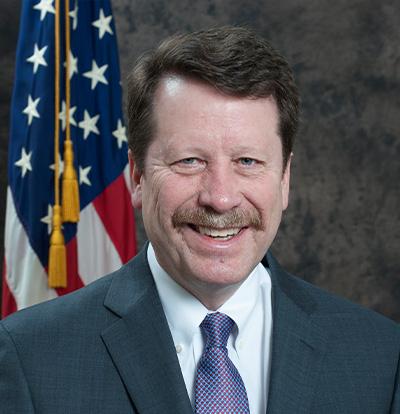 Robert M. Califf, MD, Duke University adjunct professor of medicine (cardiology) and former director of the Duke Clinical Research Institute (DCRI), has been confirmed as commissioner for the U.S. Food and Drug Administration following a vote by the Senate on Tuesday, Feb. 15. Califf’s appointment to the position will mark his second time heading the agency, which he also led during the final year of former President Barack Obama’s administration.
Robert M. Califf, MD, Duke University adjunct professor of medicine (cardiology) and former director of the Duke Clinical Research Institute (DCRI), has been confirmed as commissioner for the U.S. Food and Drug Administration following a vote by the Senate on Tuesday, Feb. 15. Califf’s appointment to the position will mark his second time heading the agency, which he also led during the final year of former President Barack Obama’s administration.
Califf was nominated to the post by President Joe Biden in November of 2021. His confirmation was hailed by his colleagues in the world of clinical research and academic medicine.
“Dr. Califf is the ideal choice to lead the FDA at this critical time,” said Mary E. Klotman, MD, dean of the Duke University School of Medicine. “He brings extraordinary experience and wisdom. I’m so appreciative of his willingness to serve our country again.”
“There’s no question that Rob Califf is the perfect fit for this job at this moment,” said Duke cardiologist and current executive director of the DCRI Adrian Hernandez, MD, a longtime colleague of Califf’s. “He has the background, the skills, the knowledge, and the personal integrity to lead the FDA at a critically important time.”
The nomination also garnered swift support from six former FDA Commissioners, who in a joint letter to the Senate confirmation committee praised Califf’s “lifelong commitment to leadership in promoting public health and advancing clinical science” and noted that his previous experience as commissioner would allow him to be uniquely well prepared to be “effective from day one.”
Califf’s new tenure at the FDA is likely to be marked by what many of his supporters consider one of his key strengths: a combination of enthusiasm and expertise applied to the task of developing scientific evidence that can be used to create better therapies and guide more informed decision-making by clinicians and patients.
That enthusiasm has long been a hallmark of Califf’s work at Duke, where he established a global reputation as an innovative and highly knowledgeable expert in clinical trials, particularly large, complex, and logistically challenging international studies.
“Rob has been a major force in establishing Duke as a leader in clinical and translational research on the world stage,” said A. Eugene Washington, MD, chancellor for health affairs at Duke University and president and CEO of Duke University Health System. “His exceptional leadership and unwavering commitment to evidence-based medicine and to the health and welfare of patients have driven us to higher levels of excellence and impact. His contributions have no doubt improved the lives of millions here and around the world, making Rob uniquely qualified to take on this pivotal role during these unprecedented times.”
Califf’s history at Duke stretches back to his undergraduate years in the early 1970s, when he majored in psychology. He went on to earn his medical degree from Duke, and aside from three years of residency in internal medicine at the University of California, San Francisco, Califf spent his entire career as cardiologist, researcher and senior leader at Duke until leaving in 2015 to assume the posts of deputy commissioner and later commissioner at the FDA.
During his medical training at Duke, Califf was mentored by Dr. Eugene Stead, Jr., a cardiologist and chair of Duke’s Department of Medicine. An early pioneer in the use of computer technology, Stead influenced Califf’s focus on gathering and analyzing data on patient outcomes. Stead’s mentorship would ignite Califf’s lifelong interest in the potential for combining computer technology with clinical data to answer important questions about medicine and patient care. That passion would ultimately lead to the creation of the Duke Clinical Research Institute, one of the world’s leading academic clinical research organizations. As the founding director of the DCRI, Califf oversaw and in many cases personally led numerous pivotal trials in cardiology and other medical specialties.
Despite the demands of his career in clinical research, throughout his decades at Duke, Califf continued to see patients as a working cardiologist. He distinguished himself as a teacher and mentor, helping to shape a new generation of physicians and clinical researchers.
After stepping down from his leadership post at the DCRI in 2006, Califf served as vice chancellor for clinical and translational research at Duke before moving to the FDA. Shortly afterward, Obama nominated him as commissioner and the Senate confirmed him in early 2016. Califf’s time at the helm of FDA was marked by efforts to update the agency’s approach to evaluating scientific evidence about the safety and effectiveness of medical products. In particular, this included developing a framework for incorporating new sources of data, including information gathered from sources such as electronic health records and administrative databases.
After leaving the FDA in early 2017, Califf returned briefly to Duke to create and lead Duke Forge, a university center for health data science, before transitioning in 2019 to a leadership role as senior adviser at Verily Life Sciences, a Google-affiliated company focused on health data. He will step down from that role to assume his new position as FDA chief.
“It’s hard for me to think of anyone who would be better prepared to lead the FDA, given the scope of Rob’s experience in patient care, research, and policy,” said Amy Abernethy, MD, PhD, president of Verily’s clinical research business and a former Duke professor of medicine who served as principal deputy commissioner and acting chief information officer at the FDA from February 2019 to April 2021. “And the fact that he’s led the FDA effectively before means that he’ll be able to get to work immediately on the most pressing issues on the agency’s to-do list. There’s no question that Rob will be prepared to hit the ground running.”
ADAPTABLE Team Selected for CR Forum Achievement Award
The Clinical Research (CR) Forum, a nonprofit organization dedicated to promoting understanding and support for clinical research and its impact on health and health care, has selected the ADAPTABLE study as a Top 10 Clinical Research Achievement Awardee for 2022. The awards recognize outstanding achievements in clinical research from across the U.S., identifying major advances in the biomedical field resulting from the nation’s investment in health and welfare.
The CR Forum will honor the ADAPTABLE research team on April 19 at a ceremony to be held at the Hyatt Regency McCormick Place in Chicago. The team will then present at Translational Science 2022 and meet with members of the U.S. Congress to promote the importance of funding for clinical research.
The CR Forum will present this award to Duke interventional cardiologist Schuyler Jones, MD, ADAPTABLE’s
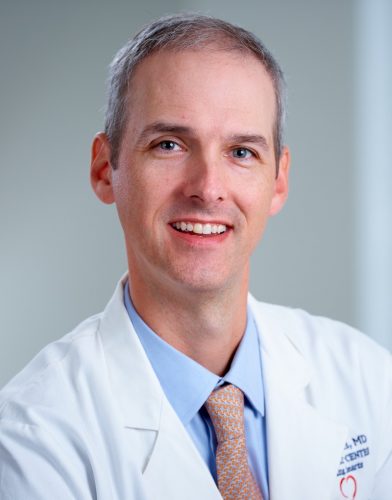
principal investigator, member of the Duke Clinical Research Institute and the lead author of the results paper, which was simultaneously published in the New England Journal of Medicine and presented at the 70th annual American College of Cardiology Scientific Session & Expo.
A pragmatic, open-label, patient-centered, randomized clinical trial, ADAPTABLE sought to determine the safest and most effective dose of aspirin for patients with existing cardiovascular disease. Despite aspirin being used as a secondary prevention method for nearly three decades, this question had not been studied previously.
Beginning in 2016, ADAPTABLE randomized 15,076 people with existing cardiovascular disease to receive either baby aspirin (81 mg) or regular strength aspirin (325 mg). Ultimately, investigators found no significant difference in either protective effects or bleeding risk between the two doses. However, the patients in the group taking the lower dose were less likely to switch doses mid-study; furthermore, that group’s patients were slightly less likely to discontinue aspirin completely.
Congratulations, Schuyler and team!
Early Exercise Interventions Used from Duke Trial to Decrease Cardiovascular Disease
With 2022 underway and the pandemic continuing, health and prevention of disease continues to be of the upmost importance. Physical activity has been shown to not only improve health, but help prevent the onset of many disorders – including cardiovascular disease.
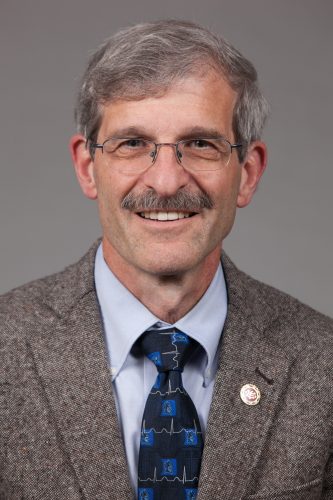 Duke cardiologist William Kraus, MD, the Richard and Pat Johnson University Distinguished Professor at Duke University School of Medicine, a researcher and affiliated faculty for the Duke Center for Applied Genomics & Precision Medicine (CAGPM), is studying exercise effects in individuals ranging from healthy to those at-risk of disease and those with disease, such as coronary heart disease.
Duke cardiologist William Kraus, MD, the Richard and Pat Johnson University Distinguished Professor at Duke University School of Medicine, a researcher and affiliated faculty for the Duke Center for Applied Genomics & Precision Medicine (CAGPM), is studying exercise effects in individuals ranging from healthy to those at-risk of disease and those with disease, such as coronary heart disease.
For the last 35 years, the Kraus laboratory particularly focuses on increased physical activity as the means by which to prevent premature cardiovascular death. Kraus’ well-known randomized exercise trials – STRRIDE (Studies of a Targeted Risk Reduction Intervention through Defined Exercise) are being used to investigate genetic predictors associated with individuals dropping out from or adherence to an exercise intervention. Postdoc Katherine Collins, PhD, is a research assistant in the Kraus Lab part of this endeavor, through the CAGPM T32 fellowship.
Specifically, Kraus Lab is currently working on a project using data from the STRRIDE trial to undertake the project, “Molecular Predictors of Dropout from and Adherence to Lifestyle Interventions.” The team has identified multiple variants within an array of genes associated with an individual’s ability to adhere to — or lack of ability to adhere to (i.e. dropout) — the STRRIDE exercise interventions. During her fellowship, Dr. Collins’ goal is to validate findings Kraus and his team have made to identify genetic variants associated with dropout and adherence to the randomized exercise trials. The team has investigated potential mediators of the genetic association with intervention dropout. During Collins’ time as a T32 fellow, she has been a valuable contributor to the project, bringing biospecimens from a 12-month behavioral weight loss randomized trial and utilizing data from the 2-year caloric restriction dietary intervention – CALERIE™ (Comprehensive Assessment of Long-term Effects of Reducing Intake of Energy) trial to further investigate Dr. Kraus’ initial findings.
“The CAGPM T32 fellowship has provided me hands-on experience, under the mentorship of Dr. Kraus, in human clinical trials, bio-banking, developing human samples into bio-molecular data, and human translational research as a whole,” said Collins. “This fellowship has helped me establish a foundation for my future research endeavors around precision medicine approaches in exercise and lifestyle interventions.”
These findings will help guide future interventions and help identify those individuals who may be most at-risk or prone to dropout or have poor adherence to exercise. The overarching goal of this investigation is to develop a personalized medicine approach for exercise, giving interventionists the ability to target at-risk individuals early in the invention process, pushing them past the key dropout phase—the initial 2 months—of the exercise intervention.
“We know physical activity is good and anything is better than none and more is better than less,” said Kraus. “However, the responses to physical activity and exercise are individually different, partly mediated by genetic factors. The tendency to engage in and maintain regular physical activity patterns are mediated by a combination of personality and genetic factors.”
Lack of physical activity is an ongoing public health concern. This is contributing to heart disease, even for people that have no risk factors, while also increasing the rates of obesity, diabetes, high blood pressure, and more.
“Outside of communicable diseases, cardiovascular disease remains the number one cause of premature death in the US and the World,” said Kraus. “The spectrum of cardiometabolic risk factors—hypertension, abnormal blood lipids and diabetes—are, separately and combined, the major non-lifestyle risk factor contributors to cardiovascular risk. Smoking, the lack of physical activity, and poor diets are the major lifestyle-related risk factors which also contribute to worsening hypertension, lipids and diabetes.”
Studies like these ultimately aim to help individuals maintain active lifestyles long-term.
Many of these issues will be addressed during the Genomic & Precision Medicine Forum being held February 24, where Kraus will be presenting on “Components of Personalized Lifestyle Medicine with a Focus on Physical Activity.” Learn more and register to attend the virtual talk on Zoom.
Kudos to Spates!
Cardiology fellow Toi Spates presented an excellent grand rounds this past week on the management of pregnancy and heart disease. Further, she did an interview on a related topic with CBS-17 (WNCN), see link below under “news”.
Nicely done!
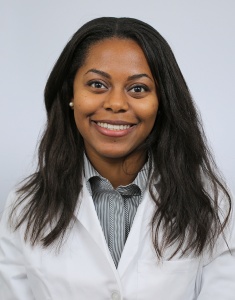
COVID-19 Updates
All the latest Clinical Operations updates related to COVID can be found at https://covid-19.dukehealth.org.
Upcoming Events & Opportunities
Cardiology Grand Rounds
March 1: Lipoprotein (a): Unveiling the Mysterious Biomarker. Presenter will be Nishant Shah. 5 p.m. via Webex. Link will be sent via email.
Duke Genomic & Precision Medicine Forum Series
February 24: Guest will be William E. Kraus, MD speaking on Components of Personalized Lifestyle Medicine with a Focus on Physical Activity. Noon – 1 p.m. via Zoom. Sponsored by Duke Center for Applied Genomics & Precision Medicine. Registration is required; event is free. To learn more and to register, please visit: https://bit.ly/3ouqDiK.
Upcoming Duke Heart CME
April 23: Duke Sports Cardiology & Sudden Death in Athletes Symposium with course directors Jim Daubert and Bill Kraus. Virtual. For information or to register, contact Christy Darnell christy.darnell@duke.edu or 919-880-8686.
Have news to share?
If you have news to share with the Pulse readership, please contact Tracey Koepke, director of communications for Duke Heart at tracey.koepke@duke.edu. We would love to hear about your latest accomplishments, professional news, cool happenings, and any events or opportunities that may be of interest to our Duke Heart family. Please call with any questions: 919-681-2868. Feedback on Pulse is welcome and encouraged. Submissions by Noon, Wednesdays, to be considered for weekend inclusion.
Duke Heart in the News:
February 11 — Tracy Wang
The Science Times
Gestational Diabetes Linked to Chronic Cardiovascular Outcome Later in Life
https://duke.is/cwaa8
February 11 — Duke University Health System
Becker’s Hospital Review
48 hospitals on Forbes’ list of best employers
https://duke.is/wz8ez
February 13 — Stuart Russell
WPTF AM-640/Podcast
Aging Matters: Heart Failure 101
https://duke.is/4w5w4
February 15 — Toi Spates
WNCN CBS-17
Most women giving birth in the US have poor heart health before pregnancy
https://duke.is/9zj9w
February 17 — Adrian Hernandez
WNCN CBS-17
Duke doctors testing whether more ivermectin for twice as long will work against COVID-19
https://duke.is/wxmgt
Division of Cardiology Publications Indexed in PubMed February 10-16, 2022
Bhasin S, Lincoff AM, Basaria S, Bauer DC, Boden WE, Cunningham GR, Davey D, Dubcenco E, Fukumoto S, Garcia M, Granger CB, Kalahasti V, Khera M, Miller MG, Mitchell LM, O’Leary MP, Pencina KM, Snyder PJ, Thompson IM, Travison TG, Wolski K, Nissen SE. Effects of long-term testosterone treatment on cardiovascular outcomes in men with hypogonadism: Rationale and design of the TRAVERSE study. Am Heart J 2022;245:41-50. PM: 34871580.
Bhatt DL, Lopes RD, Harrington RA. Diagnosis and Treatment of Acute Coronary Syndromes: A Review. JAMA 2022;327(7):662-675. PM: 35166796.
Bloomfield GS, Weir IR, Ribaudo HJ, Fitch KV, Fichtenbaum CJ, Moran LE, Bedimo R, de Filippi C, Morse CG, Piccini J, Zanni MV, Lu MT, Hoffmann U, Grinspoon SK, Douglas PS. Prevalence and Correlates of Electrocardiographic Abnormalities in Adults With HIV: Insights From the Randomized Trial to Prevent Vascular Events in HIV (REPRIEVE). J Acquir Immune Defic Syndr 2022;89(3):349-359. PM: 35147583.
Bozkurt B, Hill JA, Al-Khatib SM. Sixth Annual Go Red for Women Issue. Circulation 2022;145(7):489-490. PM: 35157526.
Cardoso R, Ternes CMP, Justino GB, Fernandes A, Rocha AV, Knijnik L, d’Avila A, Lopes RD. Non-Vitamin K Antagonists Versus Warfarin in Patients with Atrial Fibrillation and Bioprosthetic Valves: A Systematic Review and Meta-Analysis. Am J Med 2022;135(2):228-234. PM: 34634252.
Carnicelli AP, Blumer V, Genovese L, Gage A, Agarwal R, Lakdawala NK, Bohula E, Katz JN. The Road Not Yet Traveled: Distinction in Critical Care Cardiology through the Advanced Heart Failure and Transplant Cardiology Training Pathway. J Card Fail 2022;28(2):339-342. PM: 35148880.
Carnicelli AP, Clare RM, Hofmann P, Chiswell K, DeVore AD, Vemulapalli S, Felker GM, Kelsey AM, DeWald TA, Sarocco P, Mentz RJ. Clinical trajectory of patients with a worsening heart failure event and reduced ventricular ejection fraction. Am Heart J 2022;245:110-116. PM: 34932997.
Chan PS, Spertus JA, Kennedy K, Nallamothu BK, Starks MA, Girotra S. In-Hospital Cardiac Arrest Survival in the United States During and After the Initial Novel Coronavirus Disease 2019 Pandemic Surge. Circ Cardiovasc Qual Outcomes 2022;15(2):e008420. PM: 35098727.
Chew DS, Li Y, Zeitouni M, Whellan DJ, Kitzman D, Mentz RJ, Duncan P, Pastva AM, Reeves GR, Nelson MB, Chen H, Reed SD. Economic Outcomes of Rehabilitation Therapy in Older Patients With Acute Heart Failure in the REHAB-HF Trial: A Secondary Analysis of a Randomized Clinical Trial. JAMA Cardiol 2022;7(2):140-148. PM: 34817542.
Chew DS, Li Z, Steinberg BA, O’Brien EC, Pritchard J, Bunch TJ, Mark DB, Patel MR, Nabutovsky Y, Greiner MA, Piccini JP. Arrhythmic Burden and the Risk of Cardiovascular Outcomes in Patients With Paroxysmal Atrial Fibrillation and Cardiac Implanted Electronic Devices. Circ Arrhythm Electrophysiol 2022;15(2):e010304. PM: 35089799.
Chiarito M, Baber U, Cao D, Sharma SK, Dangas G, Angiolillo DJ, Briguori C, Cohen DJ, Dudek D, Džavík V, Escaned J, Gil R, Hamm CW, Henry T, Huber K, Kastrati A, Kaul U, Kornowski R, Krucoff M, Kunadian V, Mehta SR, Moliterno D, Ohman EM, Oldroyd K, Sarde. Ticagrelor Monotherapy After PCI in High-Risk Patients With Prior MI: A Prespecified TWILIGHT Substudy. JACC Cardiovasc Interv 2022;15(3):282-293. PM: 35033468.
Echouffo-Tcheugui JB, Mwasongwe SE, Musani SK, Hall ME, Correa A, Hernandez AF, Golden SH, Mentz RJ, Bertoni AG. Dysglycemia and incident heart failure among blacks: The jackson heart study. Am Heart J 2022;245:1-9. PM: 34808103.
Ekerstad N, Javadzadeh D, Alexander KP, Bergström O, Eurenius L, Fredrikson M, Gudnadottir G, Held C, Ängerud KH, Jahjah R, Jernberg T, Mattsson E, Melander K, Mellbin L, Ohlsson M, Ravn-Fischer A, Svennberg L, Yndigegn T, Alfredsson J. Clinical Frailty Scale classes are independently associated with 6-month mortality for patients after acute myocardial infarction. Eur Heart J Acute Cardiovasc Care 2022;11(2):89-98. PM: 34905049.
Fordyce CB, Giugliano RP, Cannon CP, Roe MT, Sharma A, Page C, White JA, Lokhnygina Y, Braunwald E, Blazing MA. Cardiovascular Events and Long-Term Risk of Sudden Death Among Stabilized Patients After Acute Coronary Syndrome: Insights From IMPROVE-IT. J Am Heart Assoc 2022;11(4):e022733. PM: 35112882.
Fulda ES, Fitch KV, Overton ET, Zanni MV, Aberg JA, Currier JS, Lu MT, Malvestutto C, Fichtenbaum CJ, Martinez E, Umbleja T, Douglas PS, Ribaudo HJ, Grinspoon SK. COVID-19 Vaccination Rates in a Global HIV Cohort. J Infect Dis 2022;225(4):603-607. PM: 34794178.
Gibson CM, Mack MJ, Lee VT, Schneider DJ, Sellke FW, Ohman EM, Thourani VH, Doros G, Kroger H, Cutlip DE, Deliargyris EN. Rationale and design of the safe and timely antithrombotic removal – ticagrelor (STAR-T) trial: A prospective, multi-center, double-blind, randomized controlled trial evaluating reductions in postoperative bleeding with intraoperative removal of ticagrelor. Am Heart J 2022;245:19-28. PM: 34736855.
Granger BB, Tulsky JA, Kaufman BG, Clare RM, Anstrom K, Mark DB, Johnson KA, Patel CB, Fiuzat M, Steinhauser K, O’Connor C, Rogers JG, Mentz RJ. Polypharmacy in Palliative Care for Advanced Heart Failure: The PAL-HF Experience. J Card Fail 2022;28(2):334-338. PM: 34628013.
Gutierrez JA, Christian RT, Aday AW, Gu L, Schulteis RD, Shihai L, Petrini M, Sun AY, Swaminathan RV, Katzenberger DR, Banerjee S, Rao SV. Electronic alerts to initiate anticoagulation dialogue in patients with atrial fibrillation. Am Heart J 2022;245:29-40. PM: 34808105.
Harrington J, Felker GM. Leveraging Multiple Biomarkers to Assess Risk of Acute Heart Failure: Is More Better? J Card Fail 2022;28(2):234-236. PM: 34952784.
Harrington J, Gouda P, Ezekowitz J, Mentz RJ. Exploring the pragmatic-explanatory spectrum across cardiovascular clinical trials. Contemp Clin Trials 2022;113:106646. PM: 34863929.
Hirji SA, Sabatino ME, Minhas AMK, Okoh AK, Fudim M, Vaduganathan M, Khan MS. Contemporary Nationwide Heart Transplantation and Left Ventricular Assist Device Outcomes in Patients with Histories of Bariatric Surgery. J Card Fail 2022;28(2):330-333. PM: 34509598.
Lala A, Mentz RJ. Heart Month – A Historical Look and Simple “Walk” of Acknowledgement in the Present. J Card Fail 2022;28(2):169-170. PM: 35148879.
Mac Grory B, Ohman EM, Feng W, Xian Y, Yaghi S, Kamel H, Reznik ME. Advances in the management of cardioembolic stroke associated with patent foramen ovale. BMJ 2022;376:e063161. PM: 35140114.
Megaly M, Buda K, Alaswad K, Brilakis ES, Dupont A, Naidu S, Ohman M, Napp LC, O’Neill W, Basir MB. Comparative Analysis of Patient Characteristics in Cardiogenic Shock Studies: Differences Between Trials and Registries. JACC Cardiovasc Interv 2022;15(3):297-304. PM: 35144785.
Nanna MG, Vemulapalli S, Fordyce CB, Mark DB, Patel MR, Al-Khalidi HR, Kelsey M, Martinez B, Yow E, Mullen S, Stone GW, Ben-Yehuda O, Udelson JE, Rogers C, Douglas PS. The prospective randomized trial of the optimal evaluation of cardiac symptoms and revascularization: Rationale and design of the PRECISE trial. Am Heart J 2022;245:136-148. PM: 34953768.
Nathan AS, Yang L, Yang N, Eberly LA, Khatana SAM, Dayoub EJ, Vemulapalli S, Julien H, Cohen DJ, Nallamothu BK, Baron SJ, Desai ND, Szeto WY, Herrmann HC, Groeneveld PW, Giri J, Fanaroff AC. Racial, Ethnic, and Socioeconomic Disparities in Access to Transcatheter Aortic Valve Replacement Within Major Metropolitan Areas. JAMA Cardiol 2022;7(2):150-157. PM: 34787635.
Piccini JP, Ahlsson A, Dorian P, Gillinov MA, Kowey PR, Mack MJ, Milano CA, Perrault LP, Steinberg JS, Waldron NH, Adams LM, Bharucha DB, Brin MF, Ferguson WG, Benussi S. Design and Rationale of a Phase 2 Study of NeurOtoxin (Botulinum Toxin Type A) for the PreVention of Post-Operative Atrial Fibrillation – The NOVA Study. Am Heart J 2022;245:51-59. PM: 34687654.
Rao VN, Kelsey MD, Blazing MA, Pagidipati NJ, Fortin TA, Fudim M. Unexplained Dyspnea on Exertion: The Difference the Right Test Can Make. Circ Heart Fail 2022;15(2):e008982. PM: 35038884.
Sheehy S, Fonarow GC, Holmes DN, Lewis WR, Matsouaka RA, Piccini JP, Zhi L, Bhatt DL. Seasonal Variation of Atrial Fibrillation Admission and Quality of Care in the United States. J Am Heart Assoc 2022;11(4):e023110. PM: 35156386.
Ullal AJ, Holmes DN, Lytle BL, Matsouaka RA, Sheng S, Desai NR, Curtis AB, Fang MC, McCabe PJ, Fonarow GC, Russo AM, Lewis WR, Heidenreich PA, Piccini JP, Turakhia MP, Perino AC. Achievement and quality measure attainment in patients hospitalized with atrial fibrillation: Results from The Get With The Guidelines – Atrial Fibrillation (GWTG-AFIB) registry. Am Heart J 2022;245:90-99. PM: 34932998.
Vaduganathan M, Fonarow GC, Greene SJ, Devore AD, Albert NM, Duffy CI, Hill CL, Patterson JH, Spertus JA, Thomas LE, Williams FB, Hernandez AF, Butler J. Treatment Persistence of Renin-Angiotensin-Aldosterone-System Inhibitors Over Time in Heart Failure with Reduced Ejection Fraction. J Card Fail 202;28(2):191-201. PM: 34428591.
Vemulapalli S, Kerr MSD, Roberts GJ, Prillinger JB, Meduri CU, McCarthy P. Tricuspid valve disease prevalence and the impact of tricuspid valve surgery on cardiovascular events and hospital resource use in medicare beneficiaries. Am Heart J 2022;245:100-109. PM: 34932999.
Weissler EH, Ford CB, Narcisse DI, Lippmann SJ, Smerek MM, Greiner MA, Hardy NC, O’Brien B, Sullivan RC, Brock AJ, Long C, Curtis LH, Patel MR, Jones WS. Clinician Specialty, Access to Care, and Outcomes Among Patients with Peripheral Artery Disease. Am J Med 2022;135(2):219-227. PM: 34627781.
Duke Heart Pulse week ending February 13th 2022
Shah Named Director of Duke Kannapolis Research
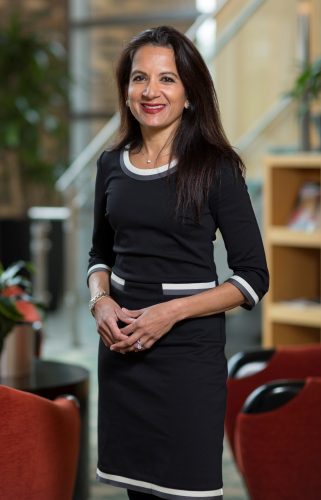 The Duke Clinical and Translational Science Institute (CTSI) this week announced Svati Shah, MD, MHS, professor of medicine in cardiology at Duke, as the new director of Duke Kannapolis Research. In this role, she will direct all activities and projects based at the Duke CTSI clinical research facility in Kannapolis, including ongoing leadership of the Duke Project Baseline initiative — a collaboration with Verily Life Sciences — and assuming leadership of the MURDOCK Study and all associated programs.
The Duke Clinical and Translational Science Institute (CTSI) this week announced Svati Shah, MD, MHS, professor of medicine in cardiology at Duke, as the new director of Duke Kannapolis Research. In this role, she will direct all activities and projects based at the Duke CTSI clinical research facility in Kannapolis, including ongoing leadership of the Duke Project Baseline initiative — a collaboration with Verily Life Sciences — and assuming leadership of the MURDOCK Study and all associated programs.
Shah is an Associate Dean for Genomics in the Duke University School of Medicine, where she is also Director of the Precision Genomics Collaboratory, Director of the Adult Cardiovascular Genetics Clinic, and the Vice-Chief of Translational Research in the Division of Cardiology.
Shah is a physician scientist and practicing cardiologist who sees patients and families with cardiovascular genetic disorders. She earned a Master of Health Science degree in epidemiology from Johns Hopkins School of Public Health and a master’s degree in Medical Genomics from Duke University, and she completed a research fellowship in genetic epidemiology at the Duke Center for Human Genetics.
Her research laboratory focuses on the molecular epidemiology of cardiometabolic diseases, using integrated omics technologies including genomics and metabolomics, to identify novel biomarkers and mechanisms of disease pathogenesis.
Shah brings a wealth of experience to her new role as Director of Duke Kannapolis Research, including her internationally recognized expertise in omics, precision medicine, and population health. Her leadership will move Duke Kannapolis forward with a renewed vision in these areas while leveraging a number of partnerships both internal and external to Duke, as well as the vital partnership with our community in Kannapolis and Cabarrus County.
Congratulations, Svati!!
Rajagopal Elected to ASCI
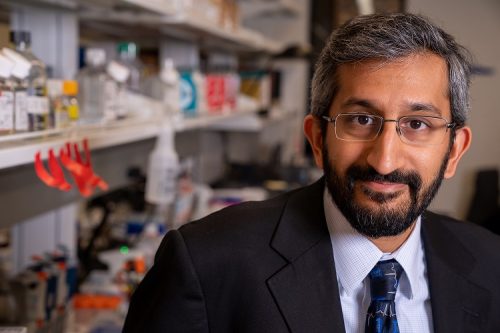 The American Society for Clinical Investigation (ASCI) this week announced the election of 95 new members for 2022. Among them, Sudarshan Rajagopal, MD, PhD, associate professor of medicine in cardiology at Duke and member of the Duke Cardiovascular Research Center.
The American Society for Clinical Investigation (ASCI) this week announced the election of 95 new members for 2022. Among them, Sudarshan Rajagopal, MD, PhD, associate professor of medicine in cardiology at Duke and member of the Duke Cardiovascular Research Center.
ASCI’s new members come from 46 different institutions and represent excellence across the breadth of academic medicine. They will be officially inducted into the Society at the ASCI Dinner and New Member Induction Ceremony on April 8, 2022, as part of the AAP/ASCI/APSA Joint Meeting planned for April 8-10 at the Swissotel Chicago.
For the 2022 membership nomination cycle, the Council considered 227 nominations and recommended 95 nominees for election.
Congratulations, Sudar. Well deserved!
USNWR Ratings vs Outcomes Data Presented at STS 2022
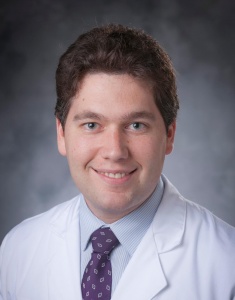 Congratulations to Oliver K. Jawitz, MD, MHS, a Duke General Surgery resident and clinical research fellow with Duke Clinical Research Institute for presenting his team’s work at the 58th Annual Meeting of the Society of Thoracic Surgeons, which was held virtually Jan. 29-30. Jawitz presented Comparing Consumer-Directed Hospital Rankings with Society of Thoracic Surgeons (STS) Adult Cardiac Surgery Database Outcomes during a plenary session on Jan. 29.
Congratulations to Oliver K. Jawitz, MD, MHS, a Duke General Surgery resident and clinical research fellow with Duke Clinical Research Institute for presenting his team’s work at the 58th Annual Meeting of the Society of Thoracic Surgeons, which was held virtually Jan. 29-30. Jawitz presented Comparing Consumer-Directed Hospital Rankings with Society of Thoracic Surgeons (STS) Adult Cardiac Surgery Database Outcomes during a plenary session on Jan. 29.
Annual hospital rankings – particularly those issued by USNWR – typically make a big splash in the news upon release, but there has been relatively little work done to explore how the rankings compare with actual patient outcomes in any specialty, according to Jawitz. His team designed a study to examine whether the rankings would correlate in a meaningful way with outcomes in adult cardiac surgery patients.
Jawitz and his team compared annual U.S. News & World Report (USNWR) rankings with risk-adjusted mortality/morbidity data from the STS Adult Cardiac Surgery Database. In total, 524,393 patients undergoing CABG or CABG with a valve procedure from 149 hospitals (65 of which were consistently ranked in the top 100 hospitals during the 5-year period examined by the team) were included in the data.
USNWR rankings rely on a complicated methodology that appears to be rigorous but is not fully transparent, says Jawitz. USNWR publishes their methodology, but it changes each year.
In the team’s preliminary dive into the data, Jawitz says he was surprised to see the impact that shifts in USNWR rankings can have on hospitals. “A one spot change in ranking from year to year has been correlated with a one-percent change in revenue and patient volume, which is significant.”
What was not surprising to him or to his team was their primary finding: that the USNWR ratings for cardiology and heart surgery programs do not correlate in any meaningful way with risk-adjusted outcomes data from the STS database.
“This was not a ground-breaking finding, to be perfectly honest,” Jawitz says. “However, what was surprising is that we found absolutely no correlation – not even a signal of correlation — between rankings and outcomes. Given the impact rankings can have can have on patient choices and, frankly, on hospital revenue and the resources that some institutions have dedicated toward trying to lift their USNWR ranking over time, we think it’s an important step to study how these rating systems compare to actual outcome measures for various specialties.”
From the standpoint of heart surgery, the gold standard is the STS database and the public reporting of STS Star Ratings.
“US News and World Report rankings can tell consumers a lot of things, but they don’t tell them enough information about surgical outcomes,” says Peter K. Smith, Mary and Deryl Hart Distinguished Professor of Surgery and former chief, Duke Division of Cardiovascular and Thoracic Surgery. “This particular ranking system combines surgery measures with cardiology measures for heart programs across the U.S., so for patients seeking information about surgical outcomes that information is obscured.
“The primary message here for consumers is that rankings should be used with caution because the differences in rankings of heart programs at U.S. hospitals don’t necessarily relate to differences in surgical outcomes across those same programs,” Smith adds. “Instead – and particularly for patients in need of heart surgery – they really need to look at the public reporting done by the STS and use that information as part of their decision-making process.”
Jawitz concurs.
“We’re really fortunate in the CT surgery world to have the STS database. The STS tracks procedures that have been incredibly well studied for decades; they have risk models and calculators and the ability to hone in on which groups really are performing well and which have some room for improvement,” Jawitz says.
“At the end of the day, the record of surgical outcomes are what should be most important to heart surgery patients – getting your procedure done safely with minimal morbidity and being able to go home to your family is what should matter most. This type of measure appears to be getting lost with high-profile ranking systems such as USNWR.”
Jawitz believes future studies should look at consumer-directed ranking systems in a rigorous and statistically sound way and suggest better ways for such rankings to map better to what matters most to patients as well as to the clinical community.
“Healthcare is a difficult enough system to navigate as it is,” he adds. “I would strongly encourage consumers who are seeking guidance toward programs to consult professional societies that publish risk-adjusted data for the area in which they need care. Relying more on those types of sources than on hospital rankings would probably be of great benefit to them.”
Jawitz and team expect to publish their findings later this year.
Great job, Oliver and team!
Also at STS 2022:
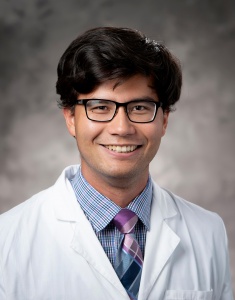 Congratulations to Christopher Jensen, MD, MHS, a general surgery resident,
Congratulations to Christopher Jensen, MD, MHS, a general surgery resident, 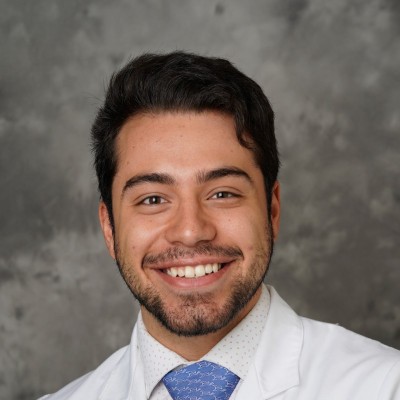 for his on-demand presentation, Cardiovascular Mechanism of Donor Brain Death and Heart Recipient Survival and to Fabian Jimenez Contreras for his on-demand presentation Progression of Aortic Valve Insufficiency During Fully Magnetically Levitated Centrifugal Versus Axial Flow Left Ventricular Assist Device (LVAD) Support that were part of STS’s 58th Annual Meeting. Jimenez Contreras, a 4th year medical student at Duke, is planning a career in cardiothoracic surgery. This was his first presentation at STS
for his on-demand presentation, Cardiovascular Mechanism of Donor Brain Death and Heart Recipient Survival and to Fabian Jimenez Contreras for his on-demand presentation Progression of Aortic Valve Insufficiency During Fully Magnetically Levitated Centrifugal Versus Axial Flow Left Ventricular Assist Device (LVAD) Support that were part of STS’s 58th Annual Meeting. Jimenez Contreras, a 4th year medical student at Duke, is planning a career in cardiothoracic surgery. This was his first presentation at STS
Well done!
Heart Month Celebration Continues!
In celebration of Heart month, the Duke Heart leadership team distributed heart-shaped cookies to team members this week.
Dr. Manesh Patel, Dr. Ed Chen, Jill Engel and the entire leadership team thanks everyone for their dedication to excellent patient care, safety and awareness as we continue to celebrate Heart Month. We hope our team members will take time to reflect on the amazing things each of them and the entire Duke Heart team have achieved over the last year. We are so fortunate to have each and every team member – we could not provide the excellent care that we do without every single one of you. Thank you!
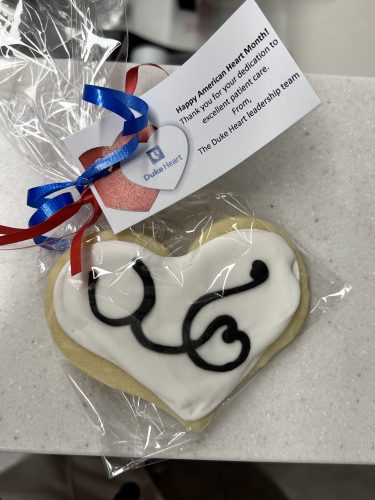
Duke Cardiac Ultrasound Students Named ASE Scholarship Award Winners
Two students in Duke’s Cardiac Ultrasound Certificate Program have won American Society of Echocardiography (ASE) Foundation student scholarships.
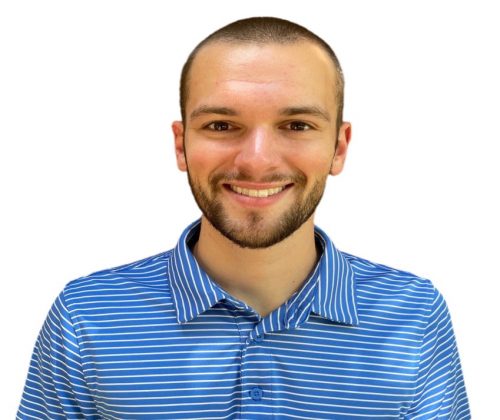 Nick Medlock has received the Waggoner Award and Daisy Chang has received the Katanick Award.
Nick Medlock has received the Waggoner Award and Daisy Chang has received the Katanick Award.
The Katanick award is given to the highest ranking student sonographer candidate nominated for ASEF scholarship awards. This award was established in 2016 and was named to honor the legacy of Sandy Katanick, RN, RVT, CAE, who retired as CEO of the Intersocietal Accreditation Commission after more than 25 years of service to the field.
This is the first year that Duke has been eligible to nominate students; only programs that are nationally accredited can nominate students. Duke’s program received accreditation in 2021.
The awards will be given to Medlock and Chang at the annual ASE meeting in June in Seattle, WA. They will each receive $1,000 and support for travel.
Congratulations to Nick and Daisy! And… hat tip to the Cardiac Ultrasound Program – your efforts are making this one of the best recognized programs in the country!
ICYMI: JCF Ignite! Featured in Medpage Today
This past week, there was a terrific piece in Medpage Today (link below, in “news”) that speaks to a new feature in the Journal of Cardiac Failure.
“At JCF, we’ve been thinking, how can we meet contemporary demands to facilitate conversation, inclusion and excitement in academic publishing? We communicate in new ways,” says Rob Mentz, associate professor of medicine in cardiology and editor-in-chief of the Journal of Cardiac Failure. “JCF Ignite! is one such initiative intended to favorably transform our field. This new section is designed to serve as a platform for very concise and rigorous reports on a novel (potentially provocative) concept, analysis, insight or data presentation. The goal is to enable authors to disseminate worthwhile material in an exceptionally timely manner to enhance impactful discourse and consider paradigm shifts in the care of patients with heart failure.”
Congrats to Mentz and the team at JCF!
Duke Schools of Medicine and Nursing Rank in Top 5 for NIH Research Funding
The medical and nursing schools at Duke University both rank in the top five nationally for research funding received from the National Institutes of Health (NIH), according to the Blue Ridge Institute for Medical Research.
Duke University School of Medicine was awarded more than $608 million in federal funding from the NIH in 2021, ranking third nationally among academic medical centers, up from 10th last year.
“The amount of research funding awarded to Duke scientists by the NIH is a key measure of excellence across all of our missions,” said Mary E. Klotman, MD, dean of Duke University School of Medicine. “These rankings reflect the hard work, dedication and innovation of our outstanding faculty and research staff, and their commitment and contributions to scientific discovery and advancing care for our patients.”
The Blue Ridge ranking — an annual, independent analysis of NIH research funds to colleges and universities — places Duke University School of Nursing at fifth in the nation, up from 8th last year, garnering $8.5 million from the NIH.
“Duke School of Nursing’s growth in research funding reflects the dedication of our faculty and their commitment to improving the health of real people, families, and communities,” said Vincent Guilamo-Ramos, PhD, dean of Duke University School of Nursing and vice chancellor of nursing affairs at Duke University. “They are shaping innovative health interventions and solutions; developing and testing technology that improves health outcomes; and designing nurse-led models of health care that truly are the future of nursing.”
At the medical school, two basic science departments and eight clinical science departments were ranked among the top 10 in the country:
#1 for Pediatrics
#1 for Surgery
#2 for Orthopedics
#5 for Neurosurgery
#6 for Internal Medicine
#8 for Anesthesiology
#9 for Genetics
#9 for Otolaryngology
#10 for Pharmacology
#10 for Ophthalmology
The NIH is the largest public funder of biomedical research in the world, investing more than $41 billion a year to advance research aimed at improving health.
COVID-19 Updates
Final Reminder: All Duke University Health System (DUHS) and Private Diagnostic Clinic (PDC) team members, regardless of work location, are required to receive and provide documentation of a completed COVID-19 booster vaccination by 10 a.m. on Tuesday, Feb. 15, 2022, or within 28 days of their eligibility under CDC and state guidelines. More details are available in this email that was sent to all staff on Tuesday, Dec. 28.
All the latest Clinical Operations updates related to COVID can be found at https://covid-19.dukehealth.org.
Upcoming Events & Opportunities
Duke Genomic & Precision Medicine Forum Series
February 24: Guest will be William E. Kraus, MD speaking on Components of Personalized Lifestyle Medicine with a Focus on Physical Activity. Noon – 1 p.m. via Zoom. Sponsored by Duke Center for Applied Genomics & Precision Medicine. Registration is required; event is free. To learn more and to register, please visit: https://bit.ly/3ouqDiK.
Upcoming Duke Heart CME
April 23: Duke Sports Cardiology & Sudden Death in Athletes Symposium with course directors Jim Daubert and Bill Kraus. Virtual. For information or to register, contact Christy Darnell christy.darnell@duke.edu or 919-880-8686.
Seeking Applicants: Chan Zuckerberg Science Diversity Leadership Award
The Chan Zuckerberg Initiative (CZI) and the National Academies of Sciences, Engineering, and Medicine invite applications for the new Science Diversity Leadership program, which will support projects led by excellent biomedical researchers who—through their outreach, mentoring, and teaching—have a record of promoting diversity, equity and inclusion in their scientific fields.
Each grant recipient will be awarded a total of $1.15 million over five years, with the first two cohorts of grantees selected in 2022 and 2023. Investigators leading the grantees’ projects will use funds to support research programs and outreach, mentoring, and teaching activities. The principal investigator must lead an independent research laboratory in a university, medical school, or nonprofit research institution in the U.S. or a U.S. territory and have started their first independent laboratory no earlier than January 1, 2012. Learn more and apply. Applications close May 19, 2022.
Have news to share?
If you have news to share with the Pulse readership, please contact Tracey Koepke, director of communications for Duke Heart at tracey.koepke@duke.edu. We would love to hear about your latest accomplishments, professional news, cool happenings, and any events or opportunities that may be of interest to our Duke Heart family. Please call with any questions: 919-681-2868. Feedback on Pulse is welcome and encouraged. Submissions by Noon, Wednesdays, to be considered for weekend inclusion.
Duke Heart in the News:
February 9 — Rob Mentz
Medpage Today
Do You Know How Many Great Ideas and Findings Never Get Published?
https://www.medpagetoday.com/opinion/revolutionandrevelation/97089
February 10 — Duke University & Health System
Forbes
America’s Best Large Employers
https://www.forbes.com/lists/best-large-employers/?sh=3369e30e7b66
Division of Cardiology Publications Indexed in PubMed February 3-9, 2022
Becker F, Dakin HA, Reed SD, Li Y, Leal J, Gustavson SM, Wittbrodt E, Hernandez AF, Gray AM, Holman RR. Lifetime cost-effectiveness simulation of once-weekly exenatide in type 2 diabetes: A cost-utility analysis based on the EXSCEL trial. Diabetes Res Clin Pract 2022 Jan;183:109152. PM: 34813910.
Bloomfield GS, Alenezi F, Chiswell K, Dunning A, Okeke NL, Velazquez EJ. Progression of cardiac structure and function in people with human immunodeficiency virus. Echocardiography 2022 Feb;39(2):268-277. PM: 35048419.
Coniglio AC, Segar MW, Loungani RS, Savla JJ, Grodin JL, Fox ER, Garg S, de Lemos JA, Berry JD, Drazner MH, Shah S, Hall ME, Shah A, Khan SS, Mentz RJ, Pandey A. Transthyretin V142I Genetic Variant and Cardiac Remodeling, Injury, and Heart Failure Risk in Black Adults. JACC Heart Fail 2022 Feb;10(2):129-138. PM: 35115086.
Fiuzat M, Hamo CE, Butler J, Abraham WT, DeFilippis EM, Fonarow GC, Lindenfeld J, Mentz RJ, Psotka MA, Solomon SD, Teerlink JR, Vaduganathan M, Vardeny O, McMurray JJV, O’Connor CM. Optimal Background Pharmacological Therapy for Heart Failure Patients in Clinical Trials: JACC Review Topic of the Week. J Am Coll Cardiol 2022 Feb 8;79(5):504-510. PM: 35115106.
Gilchrist SC, Hall JL, Khandelwal A, Hidalgo B, Aggarwal B, Kinzy C, Mallya P, Conners K, Stevens LM, Alger HM, Mehta L, Wexler L, Mega JL, Hernandez A, Hayes SN, Mieres JH, Jessup M, Roger VL. Research Goes Red: Early Experience With a Participant-Centric Registry. Circ Res 2022 Feb 4;130(3):343-351. PM: 35113661.
Harskamp RE, Fanaroff AC, Lopes RD, Wojdyla DM, Goodman SG, Thomas LE, Aronson R, Windecker S, Mehran R, Granger CB, Alexander JH. Antithrombotic Therapy in Patients With Atrial Fibrillation After Acute Coronary Syndromes or Percutaneous Intervention. J Am Coll Cardiol 2022 Feb 8;79(5):417-427. PM: 35115097.
King HA, Doernberg SB, Grover K, Miller J, Oakes M, Wang TW, McFatrich M, Ruffin F, Staman K, Lane HG, Rader A, Sund Z, Bosworth HB, Reeve BB, Fowler VG, Holland TL. Patients’ Experiences With and Gram-Negative Bacterial Bloodstream Infections: Results From Cognitive Interviews to Inform Assessment of Health-Related Quality of Life. Open Forum Infect Dis 2021 Dec 8;9(2):ofab622. PM: 35106313.
Loring Z, Bahnson TD. Is there a mortality benefit of atrial fibrillation ablation? J Cardiovasc Electrophysiol 2022 Feb;33(2):194-196. PM: 34911158.
Quintanilha JCF, Liu Y, Etheridge AS, Yazdani A, Kindler HL, Kelly WK, Nixon AB, Innocenti F. Plasma levels of angiopoietin-2, VEGF-A, and VCAM-1 as markers of bevacizumab-induced hypertension: CALGB 80303 and 90401 (Alliance). Angiogenesis 2022 Feb;25(1):47-55. PM: 34028627.
Redfors B, Simonato M, Chen S, Vincent F, Zhang Z, Thiele H, Eitel I, Patel MR, Ohman EM, Maehara A, Ben-Yehuda O, Stone GW. Ambient temperature and infarct size, microvascular obstruction, left ventricular function and clinical outcomes after ST-segment elevation myocardial infarction. Coron Artery Dis 2022 Mar 1;33(2):81-90. PM: 34569991.
Salah HM, Al’Aref SJ, Khan MS, Al-Hawwas M, Vallurupalli S, Mehta JL, Mounsey JP, Greene SJ, McGuire DK, Lopes RD, Fudim MEfficacy and safety of sodium-glucose cotransporter 2 inhibitors initiation in patients with acute heart failure, with and without type 2 diabetes: a systematic review and meta-analysis. Cardiovasc Diabetol 2022 Feb 5;21(1):20. PM:35123480
Tobin RS, Samsky MD, Kuchibhatla M, O’Connor CM, Fiuzat M, Warraich HJ, Anstrom KJ, Granger BB, Mark DB, Tulsky JA, Rogers JG, Mentz RJ, Johnson KS Race Differences in Quality of Life following a Palliative Care Intervention in Patients with Advanced Heart Failure: Insights from the Palliative Care in Heart Failure Trial.J Palliat Med 2022 Feb;25(2):296-300. PM:34851740
Toro C, Temkin N, Barber J, Manley G, Jain S, Ohnuma T, Komisarow J, Foreman B, Korley FK, Vavilala MS, Laskowitz DT, Mathew JP, Hernandez A, Sampson J, James ML, Goldstein BA, Markowitz AJ, Krishnamoorthy V, Association of Vasopressor Choice with Clinical and Functional Outcomes Following Moderate to Severe Traumatic Brain Injury: A TRACK-TBI Study. Neurocrit Care 2022 Feb;36(1):180-191.PM:34341913
Duke Heart Week Ending February 6th 2022
Highlights of the week:
National Wear Red Day
Kudos to all team members for sporting red on National Wear Red Day, Friday, Feb. 4. We remain so grateful to each of you for the work you’re doing to provide the very best care possible for our patients, for the work you do to continue to lift one another up during very stressful and challenging circumstances, and helping to increase awareness of cardiovascular disease overall. Great job! Please continue to share photos with Pulse – we’ll happily share them all month long as we celebrate Heart month!
Shown here are members of our Heart Leadership team (Heart leadership team members and administrative assistants); our VAD team (L to R: Kevin Cox, Catherine Shuford, Helen Barnes, Laura Blue, Pernestaline McAllister and Dakota Bentz); Two generations of Kelsey’s: faculty member Anita Kelsey, MD and cardiology fellow Michelle Kelsey, MD; Duke Heart administrative assistant Caleb Smith; Jill Engel & Terri Fortin; Cath lab sporting some red! (Clockwise from top L: Terri Fortin, and the sporty shoes of Larry Jackson, Jill Engel & Manesh Patel); several of our amazing WICs (L-R: Anita Kelsey, Jessie Duran, Toi Spates, Brittany Zwischenberger, and Nkiru Osude).
Looking good, everyone!!! More photos to come next week…
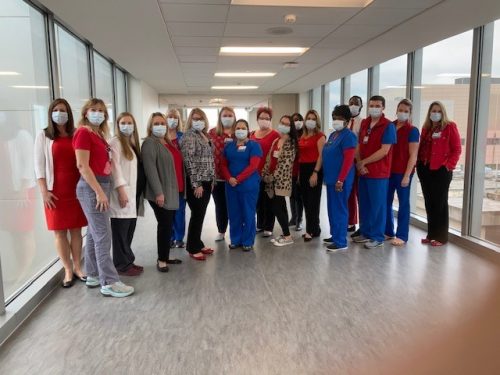

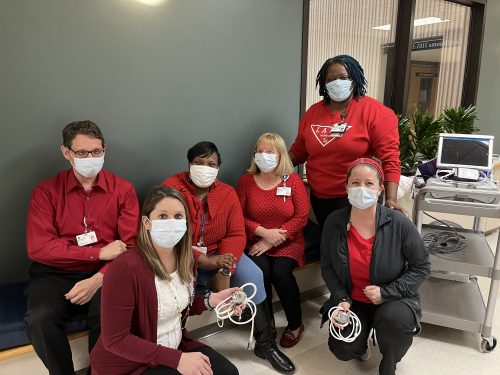
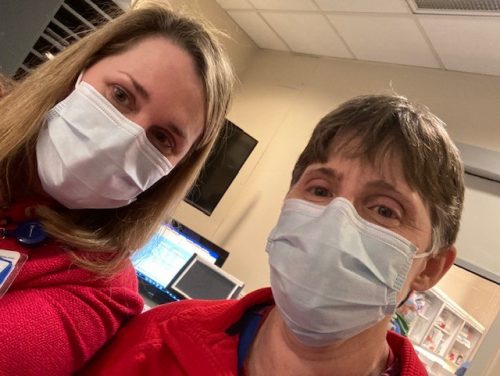
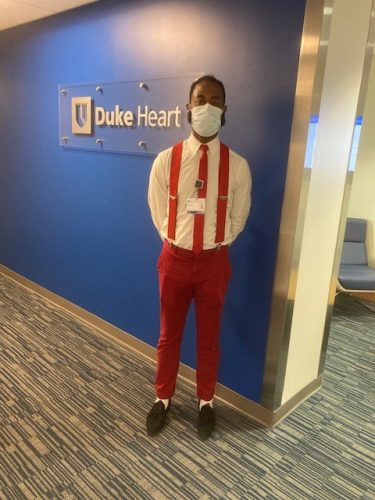
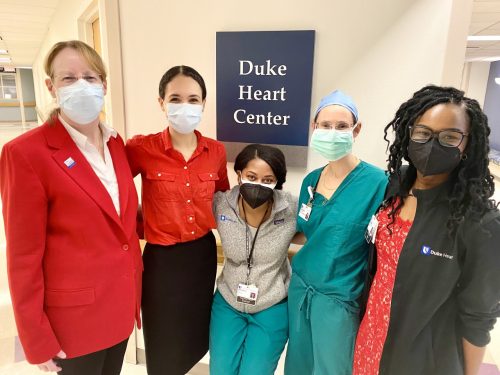
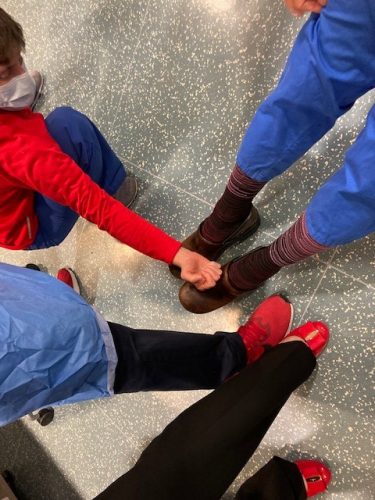
Heart Highlights: Duke Electrophysiology
It was another incredible year in Duke Heart with impressive accomplishments across the board. We are pleased to share with you just a few of the highlights from the past year from our Duke Electrophysiology team:
In calendar year 2021, (despite several waves of the COVID pandemic) Duke EP clinicians performed:
- 6316 in person device interrogations
9% increase from 2020
- 16,603 remote device interrogations
12% increase from 2020
- 1103 device implants at Duke University Hospital
No change from 2020
- 1078 EP study/ablation procedures at Duke University Hospital
10% increase from 2020
- Includes 545 AF ablations
12% increase from 2020
- Includes 138 VT ablations at Duke University Hospital
5% increase from 2020
- 54 left atrial appendage closure procedures at Duke University Hospital
- 127 lead extraction procedures within the Duke Heart network, including 34 at Wake Med-Heart Care Plus
6% increase from 2020
Duke EP welcomed several new members this year, including Daniel J. Friedman, MD, a former Duke cardiology and EP fellow who rejoined us after serving on the faculty at Yale School of Medicine; Laura Webb, PA-C, MPAS and Chrystal Foster, RNFA, FNP-C, MSN.
Team members engaged in a number of volunteer efforts, including Bill Cockfield, who served as a Covid-19 community vaccinator at the Karsh Alumni Center and Kelly Valencia, who did similarly at Duke Raleigh’s first “Pop Up” Covid-19 vaccine clinic.
Camille Frazier-Mills and Tristram Bahnson were appointed to editorial boards – Frazier-Mills to Circulation: Arrhythmia and Electrophysiology and Bahnson to Heart Rhythm O2. Multiple EP faculty members – including Bahnson, Frazier-Mills, James Daubert, Don Hegland, Larry Jackson, Kevin Jackson, Jason Koontz, Jon Piccini and Al Sun are chapter authors in the most recent edition of the popular EKG textbook Marriott’s Practical Electrocardiography (13th edition).
Notable awards this past year include:
- Brenda Smith who received the prestigious Wilma Minniear Award for Excellence in Nursing Mentorship, part of Duke’s Friends of Nursing Excellence awards;
- Kevin Thomas received the Excellence in Professionalism Award from Duke School of Medicine – the award recognizes a faculty member who exemplifies professionalism and personifies Duke’s guiding principles of respect, trustworthiness, diversity, teamwork, and learning.
Research accomplishments include:
- 108 peer-reviewed publications for 2021!
- Larry Jackson received a K-Award from the NIH’s National Heart, Lung, and Blood Institute for his project, Shared Decision-Making to Reduce Racial Disparities in Oral Anticoagulation Use in Patients with Non-Valvular Atrial Fibrillation.
- Enrollment of the first patient in the nationwide DEFINE AFIB trial, an app-based research study that will assess atrial fibrillation burden and its impact on patient outcomes, quality of life, and healthcare utilization. Jon Piccini, MD is chair of the DEFINE AFib Steering Committee.
- Sean Pokorney, MD and team on June 14th implanted the first Extravascular Implantable Cardioverter Defibrillator (EV ICD) in the Carolinas as part of the Medtronic EV ICD Pivotal Study.
- Several presentations at the European Society of Cardiology Congress, including Micra Coverage with Evidence Development (CED) Study Two Year Follow-up Results, the largest evaluation of leadless pacemakers to date, presented by Jon Piccini, MD.
- In September Drs. Al Sun and Jason Koontz conducted the first-in-man utilization of the Ventrax ventricular access sheath that was designed in collaboration with Merit Medical. The system is designed with an integrated pigtail dilator to allow seamless transition from femoral access directly to crossing the aortic valve. The sheath is FDA approved and there are ongoing efforts to test the sheath in a small trial evaluating the benefit of avoiding using an ablation catheter to cross the valve as well as the additional support of a long sheath in the LV.
- The National Institutes of Health awarded Joseph Mathew, MD, chair of Duke Anesthesiology, Jerry Reves, MD, professor of anesthesiology, and Jon Piccini, MD, MHS a $3,739,083 R01 grant for their project titled, Neurocognition and Greater Maintenance of Sinus Rhythm in AF (NOGGIN AF). Drs. Mathew, Piccini, and the Duke EP Team will test the hypothesis that restoration of sinus rhythm with catheter ablation vs drug therapy leads to less long-term neurologic damage and dysfunction due to improved cerebral blood flow and lower risk for additional ischemic injury.
Congrats to the entire Duke EP team – we know even more was accomplished than we could include here this week – what a terrific year you’ve had; there is a lot to celebrate!
ICYMI: Blumer Piece Featured by ACC
Duke Cardiology fellow Vanessa Blumer, MD, has a terrific piece in the American College of Cardiology’s Cardiology Magazine: Training Pathways for Critical Care Cardiology: The Intersection with Advanced Heart Failure. Great job!
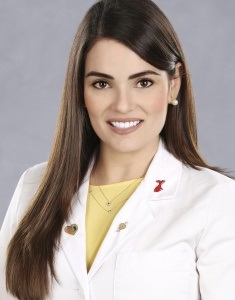
Machovec Receives DCHC Impact Award
Duke Cardiac Anesthesiologist Kelly Machovec, MD, MPH, has been awarded the Pediatric and Congenital Heart Center (PCHC) Impact Award for the exceptional impact she has had on clinical practice around hemostasis, on both a local and
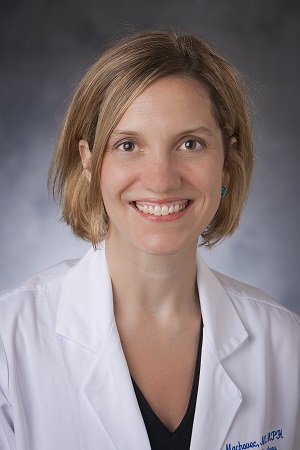
national level.
“I am grateful for the recognition and so proud to be part of the amazing PCHC team,” says Machovec, associate professor of anesthesiology. “Being a pediatric cardiac anesthesiologist is the best job in the world.”
The Pediatric and Congenital Heart Center Impact Award is an annual accolade that is decided by the voting of peers. Machovec’s colleague, Dr. Warwick Ames, presented her the award on January 26 at the PCHC yearly retreat. As he describes, “her impact is palpable everywhere in the Duke Children’s Heart Center.” Machovec is credited for discontinuing preoperative blood testing to avoid children having painful, unnecessary blood draws in the preoperative clinic, which revolutionized the way blood products are ordered for children with congenital heart disease at Duke. She also wrote the handbook of coagulation management for children coming off cardiopulmonary bypass. This led to her founding the Hemostasis Interest Group, a committee within the Congenital Cardiac Anesthesia Society, described as “a forum where some of the sharpest brains in pediatric anesthesia meet to share knowledge and expertise.”
“Kelly has had a special impact on each of us and is fully deserving of this award. I am proud to call her a dear friend and colleague and congratulate her on receiving this award,” adds Ames.
Machovec completed a fellowship in pediatric anesthesiology at Duke University before joining Duke Anesthesiology faculty in 2013 where she is a member of the Pediatric Anesthesiology Division. Machovec’s impact is also recognized outside of Duke. As a mark of her influence, she is an advocate for basic science cancer research; to-date, Machovec has raised $48,000 for the Dana-Farber Cancer Institute as part of her participation in the 2022 Boston Marathon.
Flags Lowered in Memory of Jones
University flags were lowered on Monday, Jan. 31, 2022 in memory of Robert “Bob” H. Jones, MD, Professor Emeritus of Surgery, who died on Jan. 26. We thank all who shared their thoughts of him with Pulse. A reminder that his obituary can be found here and that a memorial service will be held at 11:00 a.m. on March 5th at the Cole Mill Road Church of Christ, 1617 Cole Mill Rd, Durham, NC 27705.
COVID-19 Updates
All the latest Clinical Operations updates related to COVID can be found at https://covid-19.dukehealth.org.
Reminder: All Duke University Health System (DUHS) and Private Diagnostic Clinic (PDC) team members, regardless of work location, are required to receive and provide documentation of a completed COVID-19 booster vaccination by 10 a.m. on Tuesday, Feb. 15, 2022, or within 28 days of their eligibility under CDC and state guidelines. More details are available in this email that was sent to all staff on Tuesday, Dec. 28.
Upcoming Events & Opportunities
Cardiology Grand Rounds
February 8: No CGR today.
February 10: Topic TBA. Our guest will be AAMC President, Dr. David Skorton.
February 15: Topic TBA. Presenter will be Toi Spates.
Duke Genomic & Precision Medicine Forum Series
February 24: Guest will be William E. Kraus, MD speaking on Components of Personalized Lifestyle Medicine with a Focus on Physical Activity. Noon – 1 p.m. via Zoom. Sponsored by Duke Center for Applied Genomics & Precision Medicine. Registration is required; event is free. To learn more and to register, please visit: https://bit.ly/3ouqDiK.
Upcoming Duke Heart CME
April 23: Duke Sports Cardiology & Sudden Death in Athletes Symposium with course directors Jim Daubert and Bill Kraus. Virtual. For information or to register, contact Christy Darnell christy.darnell@duke.edu or 919-880-8686.
Seeking Applicants: Chan Zuckerberg Science Diversity Leadership Award
The Chan Zuckerberg Initiative (CZI) and the National Academies of Sciences, Engineering, and Medicine invite applications for the new Science Diversity Leadership program, which will support projects led by excellent biomedical researchers who—through their outreach, mentoring, and teaching—have a record of promoting diversity, equity and inclusion in their scientific fields.
Each grant recipient will be awarded a total of $1.15 million over five years, with the first two cohorts of grantees selected in 2022 and 2023. Investigators leading the grantees’ projects will use funds to support research programs and outreach, mentoring, and teaching activities. The principal investigator must lead an independent research laboratory in a university, medical school, or nonprofit research institution in the U.S. or a U.S. territory and have started their first independent laboratory no earlier than January 1, 2012. Learn more and apply. Applications close May 19, 2022.
Have news to share?
If you have news to share with the Pulse readership, please contact Tracey Koepke, director of communications for Duke Heart at tracey.koepke@duke.edu. We would love to hear about your latest accomplishments, professional news, cool happenings, and any events or opportunities that may be of interest to our Duke Heart family. Please call with any questions: 919-681-2868. Feedback on Pulse is welcome and encouraged. Submissions by Noon, Wednesdays, to be considered for weekend inclusion.
Duke Heart in the News:
January 27 — Christopher Granger
Healio/Cardiology
Early referral for ablation may be needed for certain patients with AF
https://duke.is/gb3gw
January 31 — Midge Bowers
NPschools.com
Day in the Life of a Cardiology NP – Two Experts Share Their Perspectives
https://duke.is/vxj3b
February 1 — L. Kristin Newby
MCG magazine/Augusta University
https://duke.is/m2enw
February 2 — John Haney
Fierce Biotech
Paragonix’s lung transport system completes 4,700-mile, cross-country transplant
https://duke.is/8rb6a
February 2 — Duke University Hospital (Lung Tx program)
Becker’s Hospital Review
10 hospitals performing high volumes of lung transplants
https://duke.is/2d5z7
February 3 — Adam DeVore
WSOCtv.com (Charlotte)
‘Saved my life’: Harrisburg man is first in North America with artificial heart
https://bit.ly/3rw2pGQ
February 4 — Svati Shah
CBS17.com (Raleigh)
National Wear Red Day seeks to raise awareness among women about heart disease
https://bit.ly/34mF3uf
Division of Cardiology Publications Indexed in PubMed January 27-February 2, 2022
Al-Khatib SM, Link MS. Perplexing Results From the PRAETORIAN Trial: Revisiting the Debate About the Value of Antitachycardia Pacing. Circulation 2022;145(5):330-332. PM: 35100016.
Carnicelli AP, Hong H, Connolly SJ, Eikelboom J, Giugliano RP, Morrow DA, Patel MR, Wallentin L, Alexander JH, Cecilia Bahit M, Benz AP, Bohula EA, Chao TF, Dyal L, Ezekowitz M, A A Fox K, Gencer B, Halperin JL, Hijazi Z, Hohnloser SH, Hua K, Hylek E, et al. Direct Oral Anticoagulants Versus Warfarin in Patients With Atrial Fibrillation: Patient-Level Network Meta-Analyses of Randomized Clinical Trials With Interaction Testing by Age and Sex. Circulation 2022;145(4):242-255. PM: 34985309.
Chandra A, Skali H, Claggett B, Solomon SD, Rossi JS, Russell SD, Matsushita K, Kitzman DW, Konety SH, Mosley TH, Chang PP, Shah AM. Race- and Gender-Based Differences in Cardiac Structure and Function and Risk of Heart Failure. J Am Coll Cardiol 2022;79(4):355-368. PM: 35086658.
Chau KH, Chen S, Crowley A, Redfors B, Li D, Hahn RT, Douglas PS, Alu MC, Finn MT, Kodali S, Jaber WA, Rodriguez L, Thourani VH, Pibarot P, Leon MB. Paravalvular regurgitation after transcatheter aortic valve replacement in intermediate-risk patients: a pooled PARTNER 2 study. EuroIntervention 2022;17(13):1053-1060. PM: 34483095.
Collins KA, Ross LM, Piner LW, Fos LB, Slentz CA, Bateman LA, Willis LH, Bales CW, Siegler IC, Wolever RQ, Huffman KM, Kraus WE. Amount and intensity effects of exercise training alone versus a combined diet and exercise lifestyle intervention on health-related quality of life in the STRRIDE-PD randomized trial. BMJ Open Diabetes Res Care 2022;10(1):e002584. PM: 35086944.
DeVore AD, Hill CL, Thomas LE, Albert NM, Butler J, Patterson JH, Hernandez AF, Williams FB, Shen X, Spertus JA, Fonarow GC. Identifying patients at increased risk for poor outcomes from heart failure with reduced ejection fraction: the PROMPT-HF risk model. ESC Heart Fail 2022;9(1):178-185. PM: 34791838.
El-Chami MF, Garweg C, Iacopino S, Al-Samadi F, Martinez-Sande JL, Tondo C, Johansen JB, Prat XV, Piccini JP, Cha YM, Grubman E, Bordachar P, Roberts PR, Soejima K, Stromberg K, Fagan DH, Clementy N. Leadless pacemaker implant, anticoagulation status, and outcomes: Results from the Micra Transcatheter Pacing System Post-Approval Registry. Heart Rhythm 2022;19(2):228-234. PM: 34757189.
Ezekowitz JA, Alemayehu W, Rathwell S, Grant AD, Fiuzat M, Whellan DJ, Ahmad T, Adams K, Piña IL, Cooper LS, Januzzi JL, Leifer ES, Mark D, O’Connor CM, Felker GM. The influence of comorbidities on achieving an N-terminal pro-b-type natriuretic peptide target: a secondary analysis of the GUIDE-IT trial. ESC Heart Fail 2022;9(1):77-86. PM: 34784657.
Govsyeyev N, Nehler MR, Low Wang CC, Kavanagh S, Hiatt WR, Long C, Jones WS, Fowkes FGR, Berger JS, Baumgartner I, Patel MR, Goodney PP, Beckman JA, Katona BG, Mahaffey KW, Blomster J, Norgren L, Bonaca MP. Etiology and outcomes of amputation in patients with peripheral artery disease in the EUCLID trial. J Vasc Surg 2022;75(2):660-670. PM: 34597783.
Greene SJ, Butler J, Fonarow GC. In-hospital initiation of quadruple medical therapy for heart failure: making the post-discharge vulnerable phase far less vulnerable. Eur J Heart Fail 2022;24(1):227-229. PM: 34779112.
Gupta K, Girotra S, Nallamothu BK, Kennedy K, Starks MA, Chan PS. Impact of the three COVID-19 surges in 2020 on in-hospital cardiac arrest survival in the United States. Resuscitation 2022;170:134-140. PM: 34838661.
Katz DH, Tahir UA, Bick AG, Pampana A, Ngo D, Benson MD, Yu Z, Robbins JM, Chen ZZ, Cruz DE, Deng S, Farrell L, Sinha S, Schmaier AA, Shen D, Gao Y, Hall ME, Correa A, Tracy RP, Durda P, Taylor KD, Liu Y, Johnson WC, Guo X, Yao J, Ida Chen YD, et al. Whole Genome Sequence Analysis of the Plasma Proteome in Black Adults Provides Novel Insights Into Cardiovascular Disease. Circulation 2022;145(5):357-370. PM: 34814699.
Kittipibul V, Fudim M. Tackling Inflammation in Heart Failure With Preserved Ejection Fraction: Resurrection of Vagus Nerve Stimulation? J Am Heart Assoc 2022;11(3):e024481. PM: 35023352.
Mac Grory B, Piccini JP, Yaghi S, Poli S, De Havenon A, Rostanski SK, Weiss M, Xian Y, Johnston SC, Feng W. Hyperglycemia, Risk of Subsequent Stroke, and Efficacy of Dual Antiplatelet Therapy: A Post Hoc Analysis of the POINT Trial. J Am Heart Assoc 2022;11(3):e023223. PM: 35043692.
Narins CR, Aktas MK, Chen AY, McNitt S, Ling FS, Younis A, Zareba W, Daubert JP, Huang DT, Rosero S, Kutyifa V, Goldenberg I. Arrhythmic and Mortality Outcomes Among Ischemic Versus Nonischemic Cardiomyopathy Patients Receiving Primary ICD Therapy. JACC Clin Electrophysiol 2022;8(1):1-11. PM: 34454875.
Ngeno GTK, Barasa F, Kamano J, Kwobah E, Wambui C, Binanay C, Egger JR, Kussin PS, Thielman NM, Bloomfield GS. Feasibility of Cardiac Rehabilitation Models in Kenya. Ann Glob Health 2022;88(1):7. PM: 35087707.
Norgren L, North R, Baumgartner I, Berger JS, Blomster JI, Hiatt WR, Jones WS, Katona BG, Mahaffey KW, Mulder H, Patel MR, Rockhold FW, Fowkes FGR. World regional differences in outcomes for patients with peripheral artery disease: Insights from the EUCLID trial. Vasc Med 2022;27(1):21-29. PM: 34516308.
Oliver CE, Patel H, Hong J, Carter J, Kraus WE, Huffman KM, Truskey GA. Tissue engineered skeletal muscle model of rheumatoid arthritis using human primary skeletal muscle cells. J Tissue Eng Regen Med 2022;16(2):128-139. PM: 34781416.
Oster ME, Shay DK, Su JR, Gee J, Creech CB, Broder KR, Edwards K, Soslow JH, Dendy JM, Schlaudecker E, Lang SM, Barnett ED, Ruberg FL, Smith MJ, Campbell MJ, Lopes RD, Sperling LS, Baumblatt JA, Thompson DL, Marquez PL, Strid P, Woo J, Pugsley R, Reagan-S. Myocarditis Cases Reported After mRNA-Based COVID-19 Vaccination in the US From December 2020 to August 2021. JAMA 2022;327(4):331-340. PM: 35076665.
Smith ID, Ross LM, Gabaldon JR, Holdgate N, Pieper CF, Ning TC, Kraus WE, Huffman KM. The Relation of Accelerometer-Measured Physical Activity and Serum Uric Acid Using the National Health and Nutrition Survey (NHANES) 2003-2004. Front Sports Act Living 2022;3:775398. PM: 35098119.
Tsai S, Liu Y, Alaiti MA, Gutierrez JA, Brilakis ES, Banerjee S. No benefit of vorapaxar on walking performance in patients with intermittent claudication. Vasc Med 2022;27(1):33-38. PM: 34609939.
Wang H, Kurniansyah N, Cade BE, Goodman MO, Chen H, Gottlieb DJ, Gharib SA, Purcell SM, Lin X, Saxena R, Zhu X, Durda P, Tracy R, Liu Y, Taylor KD, Johnson WC, Gabriel S, Smith JD, Aguet F, Ardlie K, Blackwell T, Reiner AP, Rotter JI, Rich SS. Upregulated heme biosynthesis increases obstructive sleep apnea severity: a pathway-based Mendelian randomization study. Sci Rep 2022;12(1):1472. PM: 35087136.
Wharton JM, Piccini JP, Koren A, Huse S, Ronk CJ. Comparative Safety and Effectiveness of Sotalol Versus Dronedarone After Catheter Ablation for Atrial Fibrillation. J Am Heart Assoc 2022;11(3):e020506. PM: 35060388.
Woldu B, Temu TM, Kirui N, Christopher B, Ndege S, Post WS, Kamano J, Bloomfield GS. Diastolic dysfunction in people with HIV without known cardiovascular risk factors in Western Kenya. Open Heart 2022;9(1):e001814. PM: 35064055.
Recent Comments